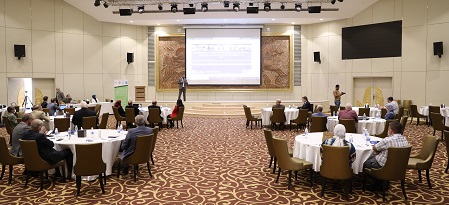Financed by the Government of Germany, the findings will inform policy and WASH programming and enhance infection prevention control measures across the country

Baghdad, 7 July 2022 — The Ministry of Health in Iraq, in cooperation with the World Health Organization (WHO) and UNICEF, yesterday released the results of the comprehensive assessment of water, sanitation and hygiene (WASH) and infection prevention and control (IPC) services in health care facilities in Iraq, with the financing from the Government of Germany.
The assessment was conducted on 3624 health facilities in Iraq. The findings of the assessment indicated that the provision of water, sanitation, hand hygiene, environmental cleanliness, health care waste management, and IPC services in health facilities is largely hindered by a lack of financial resources, conflicts and the absence of monitoring and preservation of public property.
The progress of health care system rebuilding in Iraq has been hindered by many factors of conflict and instability, including the COVID-19 pandemic. The public health care system faces chronic impediments, with around half of the primary care facilities in the country not staffed by doctors and most of these buildings have no running water. This indicated the necessity of an assessment of the availability and status of WASH-IPC services within health facilities to inform policy and WASH programming.
The assessment aims to enhance monitoring of WASH-IPC measures in health facilities and find gaps analysis, which could lead to implementing possible mitigation or required corrective action and draw decision-makers' attention to the WASH and IPC situation in health facilities throughout Iraq.
"This assessment is critical as it enables mapping, analysis and the formulation of recommendations that will enable all stakeholders and decision-makers to take evidence-based decisions and implement the necessary interventions to enhance infection prevention controls in order to achieve comprehensive WASH coverage in health facilities," said Dr Ahmed Zouiten, WHO Representative in Iraq.
“Systematic monitoring and assessment are vital for providing safe and quality health care, and to improve our accountability to the affected population. Guided by the assessment results, UNICEF will work alongside WHO and the Government at federal and the Kurdistan region level to ensure our collective contribution to provide safe water and mitigate preventable infections,” said Ms Janet Kamau, Officer-in-charge UNICEF Representative in Iraq.
A digital online monitoring and analysis dashboard was also designed to help the Ministry of Health, WHO and UNICEF to enhance the infrastructure of WASH services and health facilities in general.
Improved WASH and IPC services in health care facilities are of significant public health importance as these are associated with reduction in the transmission of health care-acquired infections.


